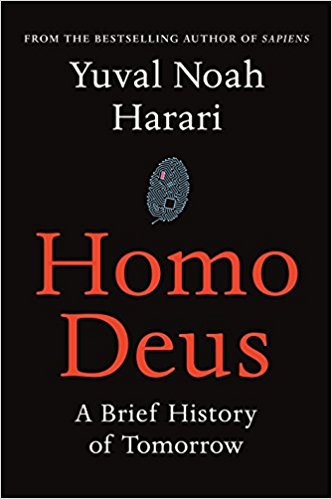Homo Deus Summary
5 min read ⌚

A Brief History of Tomorrow
In “Sapiens” we read Yuval Noah Harari’s history of humanity’s yesterdays. It was only a matter of time before we embarked on a journey through the history of humanity’s tomorrows.
Ladies and gentlemen: “Homo Deus”.
About Yuval Noah Harari
 Yuval Noah Harari is an Israeli professor of history at the Hebrew University of Jerusalem.
Yuval Noah Harari is an Israeli professor of history at the Hebrew University of Jerusalem.
He has published five books but earned his stellar reputation only after the fourth one: “Sapiens”. “Homo Deus” was his next, and, so far, the last book.
“Homo Deus PDF Summary”
When Harari’s “Sapiens” first appeared, the book rose “explosively to the ranks of an international bestseller.”
The man who wrote the last part of the last sentence is none other than Jared Diamond, the author of “Why Is Sex Fun?” and one of the smartest people alive.
Diamond also went on to explain the reasons why: “it tackles the biggest questions of history and of the modern world, and it is written in an unforgettably vivid language.”
The very same thing can be said for “Homo Deus”, the companion volume of “Sapiens.”
And, in fact, it has been said by many people, one of them of Jared Diamond’s rank. We’re talking about Nobel-Prize winner and “Thinking, Fast and Slow” author Daniel Kahneman.
His words?
“’Homo Deus’ will shock you. It will entertain you. Above all, it will make you think in ways you had not thought before.”
And when Diamond and Kahneman say that something is worth reading – then the rest of us should have no other option but to read it.
While “Homo Deus” is the tomorrow to “Sapiens” yesterday, it’s in many ways all about what is already happening today. And what is becoming – as Kevin Kelly would say – more and more inevitable.
The book itself is divided in three parts, prefaced by one introductory chapter.
The latter one – titled “The New Human Agenda” – aims to understand what is next on humanity’s agenda. A good question as any, especially in view of some of the statistics which Harari makes known.
For example, did you know that, nowadays, for the first time in history, you’re more likely to commit a suicide than to be killed in a bloody conflict? Or to die of obesity rather than famine?
Even diseases are not as serious as you think they are: the Ebola crisis resulted in no more than 11,000 deaths! Compare that to the Black Death pandemic and about 200 million people killed during the 1330s!
In other words: we’ve come far! And we are finally free to think about some things people before us couldn’t even have dreamt about! Yes, we’re talking about things such as immortality, space colonies, omniscience!
Or, to put it as succinctly as possible: becoming Gods!
But, how did we get to there?
Well, the first two-chaptered section of “Homo Deus” is titled “Homo Sapiens conquers the world” and it mainly deals with how a single animal species managed to become “the most powerful species in the world.”
In short, it’s not because humans are inherently more capable than animals; it’s because they cooperated on enormous scales.
And that was made possible through the use of something Harari names “intersubjective reality.”
The second part of “Homo Deus,” “Homo Sapiens gives meaning to the world,” explores this phenomenon in four chapters – spellbindingly and appealingly.
And you may already know it intuitively if you have read our summary of Rolf Jensen’s “The Dream Society”.
There, Jensen claimed that storytelling is humanity’s past – and its future. And this is what “intersubjective reality” is based upon.
Simply put, the actual reality is infinitely more complex than the one we think we know. However, we have silently agreed to believe in some sort of a shared reality so as to be able to cooperate better.
Just think about it:
Religion, countries and borders, money – these are all, strictly speaking, lies. They are stories which help us find a meaning in our reality and organize it better.
And our evolution has mirrored the evolution of our stories (and vice versa). Where once we had “God” and “religion” we currently have “science” and “humanism.”
For better or for worse.
In fact, that’s exactly what the third part of “Homo Deus” – “Homo Sapiens loses control” – goes on to answer.
Namely, we’ve gained a lot when we decided to replace the main story of our existence. Because, up until the 19th century, we were sure that a certain God controlled our lives and we considered famine and diseases as punishments for our actions.
But, then, science introduced a new intersubjective reality, one in which we were able to act on our own behalf. And, consequently, one in which we made famine and diseases obsolete.
However, also one in which we’ve sacrificed things such as empathy and meaning and started living by algorithms. We’ve solved numerous problems, and even managed to create life! We’ve evolved from God’s puppets to divine puppeteers!
The next phase, according to Harari, is Homo Deus – an immortal being capable of using big data to answer almost any question.
The three Harari leaves us with on the last page of his book are so thought-provoking, we’ll just have to quote them in entirety:
“1. Are organisms really just algorithms and is life really just data processing?
2. What’s more valuable – intelligence or consciousness?
3. What will happen to society, politics and daily life when non-conscious but highly intelligent algorithms know us better than we know ourselves?”
Key Lessons from “Homo Deus PDF”
1. Yesterday: Homo Sapiens Conquered the World
2. Today: Homo Sapiens Gives Meaning to the World
3. Tomorrow: Homo Sapiens Will Lose Control
Yesterday: Homo Sapiens Conquered the World
In essence, Homo sapiens is merely a single animal species, not much different from bears or elephants and even less dissimilar to chimpanzees and bonobos.
However, you wouldn’t think that if you take into consideration that you eat most of the other animals on a daily basis.
But, you can do that – because homo sapiens was smarter and more cooperative than any other species. So, it climbed at the top of the evolutionary ladder.
And it has stayed there for centuries.
Today: Homo Sapiens Gives Meaning to the World
Homo sapiens is so special because it is capable of giving the world some meaning which is inherently absent from it.
Once upon a time, we did that through myths. Then we moved on to religion. Afterward, nations, economies, and ideologies followed.
Nowadays, it’s humanism – or, more precisely, liberalism – the dominant narrative. It believes in the value of everyone’s life and everyone’s freedom of choice.
But, it’s under threat – from the very things it produced.
Tomorrow: Homo Sapiens Will Lose Control
Namely, science.
Science has made us almost all-powerful beings. However, in the pursuit to become even more powerful, we’ve forgotten that we’re part of a world where we are still just one species. So, we’ve not only started other species’ extinctions, we’ve also started the extinction of our own species.
Homo Sapiens is creating something new – Homo Deus. The problem is that, once the process is finished, we’ll not be at the top of the evolutionary ladder.
We’re willingly giving up control.
And who knows what that will result in.
Like this summary? We’d like to invite you to download our free 12 min app, for more amazing summaries and audiobooks.
“Homo Deus” Quotes
This is the best reason to learn history: not in order to predict the future, but to free yourself of the past and imagine alternative destinies. Share on X We do not become satisfied by leading a peaceful and prosperous existence. Rather, we become satisfied when reality matches our expectations. Share on X Sugar is now more dangerous than gunpowder. Share on X The most common reaction of the human mind to achievement is not satisfaction, but craving for more. Share on X History isn’t a single narrative, but thousands of alternative narratives. Whenever we choose to tell one, we are also choosing to silence others. Share on X
Emir is the Head of Marketing at 12min. In his spare time, he loves to meditate and play soccer.






